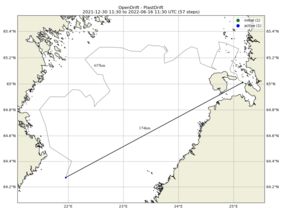The simulated case of the plastic wrapper in ice was the longest of our four cases, lasting for 5 and half months. Because the sea was covered by ice, the item could not travel as far as it could have in open sea conditions, but it still managed to cover 400 km. As ice cover gave way to open sea towards the end of the simulation period, especially in May, the distance covered by the wrapper increased. The final location of the wrapper was less than 200 km from the starting point, which is much shorter distance when compared to the journeys traveled by the items in the other cases. However, as most of this journey was done under the ice, and the wrapper still covered over 400 km, so this can be regarded as a significant achievement. If plastic litter finds its way into the sea during winter, it can surface far away from the starting as ice melts away.
But what happens to plastics in cold, icy conditions? The cold water can slow down the degrading process, so the wrapper might not release as many small bits of plastics into the sea under the ice as it would in warmer sea temperatures and in open sea conditions. And as the ice melts, it might reveal a lot of litter that has traveled long distances under the ice. As the temperatures are rising, the the plastics can start to disintegrate again. The item that might have disappeared from our "radar" in the process, can show up in our neighbours's doorstep. Out of sight, out of mind, someone might think, but since we share the same waterbody, we should take care of it together. Bin it, don't sink it matters.

